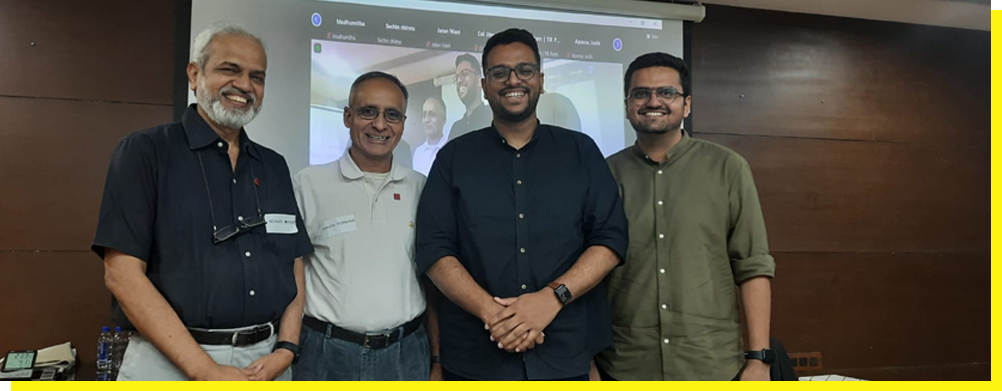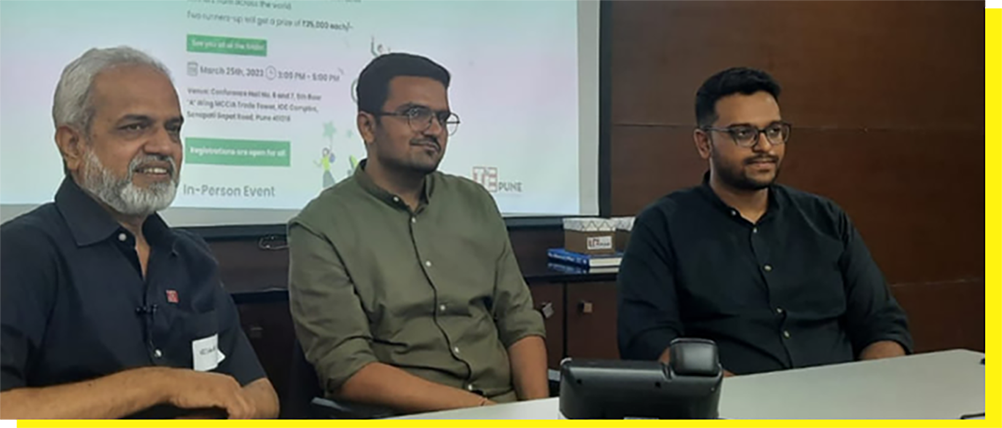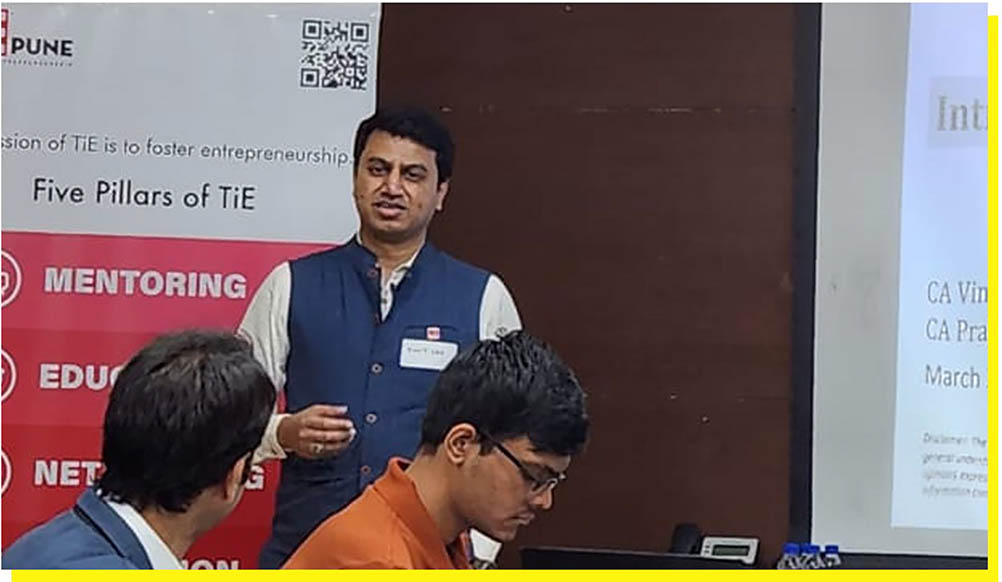
Students are the flavour of this month’s InSync. Starting with the student who won the BizQuoTiEnt contest and the story of two college students who started by wanting to help their classmates ended up redefining gig work in India. Also, a lowdown on Funding.
Celebrating Entrepreneurship!

On March 25, TiE Pune had the finals of the BizQuoTiEnt contest that had five finalist teams vying for the prize. Three months ago, 161 teams from 79 colleges in the city applied with their business plans. After two rounds of elimination, five teams hit the finals.
Each team presented to the jury members Nitin Vishwas, Co-Founder at Moonshine, Sandeep Chawda, Managing Partner at Pentathlon Ventures and Subbu Pericherla, Charter Member at TiE Hyderabad. The winner was Shalmali Kadu, student of Cummins College of Engineering who has created a new wearable product that can help reduce stress and anxiety for the wearer. While this awaits Govt. clearance, Shalmali won the prize of Rs. 100,000/- that she aims to put to good use in her company – Innergize.
The first runner-up was ProBar Nutrition created by Akhshat Bhatia. This has no artificial sugars, preservatives and so on. Akhshat was awarded Rs. 25,000 and the second runner-up was X-Gen Fuels who, like a magician, gave a demo of burning hydrogen expunged from water! Says Ajinkya Salve, co-founder, “our patent pending technology can make hydrogen from water. More importantly it can be easily set up at existing petrol pumps at one tenth the cost.” The other two finalists were Floral Fusion that converts waste flowers into leather and Kaza, an app that helps people with discovery and delivery of street food.
Ramesh Mirakhur, Chair TiE Pune University Program, reiterated that “it is important to never forget what your role as an entrepreneur is. Whether you win contests or not, it is vital that you keep at it till you get better, and launch your company and provide jobs. That is the goal of entrepreneurship. Our country churns out approximately 6.5 million graduates every year. Can you imagine the pressure it will build to provide that many jobs? Instead, if some of them understand the value entrepreneurship brings in terms of creating wealth, providing goods and services needed by people and jobs, this will only help build our nation.”
How They 'Gigged' India

Telling stories is probably one of the best ways to learn lessons. At TiE Pune’s My Story session with the founders of Gig India – Sahil Sharma and Aditya Shirole on March 17, the audience was spellbound. Because it had serendipity, inventive thinking, technology, markets, revenues… all the ingredients of business orchestrating a success dance.
Vishwas Mahajan, Charter Member TiE Pune got these two founders of Gig India to tell their story.
The Beginning:
Sahil: We met quite by chance on the first day of college at PICT. Both of us were not carrying ID cards and were hauled up to the principal’s office. That turned out to be the most fortuitous of relationships that we built in our college years. And the idea of Gig India started there. We were staying as PGs and our flatmates wanted internships at different companies. But attendance was compulsory at PICT. So, we thought, was there a way to get them internships without missing college? Which would be not attending office. So, we hit upon the idea of part time jobs which served both needs – the college’s as well as companies.
Aditya: Initially we started by building a social media app for college students. Our strategy then was if we got the girls, the boys would follow. So, we began by getting Cummins students enrolled. It worked. The social media app was called Explore Innovative Technologies.
Soon the duo had 10,000 students enrolled on their app. Soon this changed.
Sahil: Since I had worked on getting sponsorships for our college events for three years, I had contacts with companies. This saw a lot of traction and soon we morphed from a social media platform to Gig India. All the students who were on our app earlier simply glided on to this.
Did you get any support from college in the early days?
Sahil: Attendance was a big thing, so in a way our friends helped us with that. And after we had convinced a few professors, they too supported us.
How did you reach out to customers?
Sahil: Companies are always looking out for ways to cut fixed operating costs and internship is a great way to do that. And we had about 5000-6000 students using the app. It worked.
Tell us about your fund-raising efforts?
Aditya: In the early days we charged students a small fee to get them part-time jobs. All this was happening without the knowledge of our parents. When we had some traction, we stopped charging students a membership fee and charged the companies. Meanwhile our parents were badgering us to find ourselves a job. Our friends were all getting placed with good companies. Luckily for us we made about Rs. 20 lakhs in our final year and that was when we informed our parents about Gig India.
Sahil: In Oct 2016, we made our first pitch. But the investor had some tough experience with some IITB students who had done nothing. So, his condition was that we first finish our graduation. Aditya cleared his exam.
Aditya: Our first group of customers had a Chinese investor who liked what we were doing. But from the pitch to the money took one and a half years. There was a lot of paperwork and the clauses in the term sheets needed some lawyer that we could not afford. So, we did agree to some clauses that we shouldn’t have, but… live and learn
Sahil: Our first round which fructified in 2018 was for $ 100,000. That was from Chinese investors.
Gig India in the times of Covid:
Sahil: In the second round we were to receive funds from a Japanese investor but they backed out at the last minute. And that was the lowest point in our journey. Luckily we got into TiE’s Nurture program and it was angel funding from Ravi Nigam and Kiran Deshpande that helped us. The first time around it was our student story that got us the funds. But by then Covid came and now the workforce underwent a change. We now had job seekers who were looking for jobs but were not getting it so were open to part time work. So, at first, we started serving highly skilled workers like website makers, designers, etc.
Tell us how the gig economy played out for you?
What kind of jobs happened through gigs?
Sahil: Honestly, gigs existed from the very beginning. Check out the labour nakas where a large number of construction workers gather every morning looking for work. They work for a day and get paid. What we did was put technology in the place of a labour naka. Now people did not have to go to a fixed place to look for a job but a platform.
Aditya: We started with high-skill jobs like website makers, designers etc. Then with Covid, driving cabs and delivering food parcels became a requirement. But the mid skill section like sales, audits, tele calling somehow didn’t have this sort of play.
Sahil: The other models (high and low skilled) were quite self-sufficient. But the mid skill model we realized required some management of the process.
How do you manage the quality of work?
Do you see the market growing?
Sahil: Well, this surely makes a lot of sense to giggers as well as the companies. 65% of all people employed are looking for a source of second income and 200 Million households earn less than Five lakhs p.a. On the other hand, enterprises are looking for ways to cut fixed operating costs. Yes, quality has always been on our mind. And we have used technology to solve this problem. We have managed to automate the quality check to a large extent. Now, we pick only those tasks where quality checks can be automated. This proved to be a big differentiator for us.
Aditya: And with internet penetration, such opportunities have become more accessible
What is your net promoter score in terms of customers?
Sahil: We never had a problem with retaining our customers. 90% of our customers continue with us beyond three to four months
Can you give us an idea of the value generated by Gig India?
How many hours of work did you manage?
Aditya: In about five years we have done about Five Million tasks and were making about $1 Million a month before we got acquired by PhonePe, coincidentally on this day last year. We realized that it was not important to make a lot of money from many jobs, rather do fewer jobs that paid better. In those days we had about 20,000 people making money every month.
Did the companies not want to circumvent you after the initial contact?
Sahil: Well, the companies were not coming to us because they needed to connect with workers. The problem we were solving for them was to manage these jobs without the hassle and cost of managing the people. On the other side giggers were not sure of whether they would get paid after the job, so it worked both ways for us.

How has life changed for you?
Sahil: Aditya is very humble and I am not. He’s taught me humility. Besides that, there’s not been much change in our lives or the way we do everyday business.
Aditya: But on the work side now we are with super talented people in Bangalore and that is fantastic. Quite a great learning experience for us.
Money Matters
Funding is one the most vital keys to success of your business. Vinit Deo, TiE Charter Member and CMD Posiview Ventures gave members a lowdown on Funding. Posiview Ventures works with start-ups on the one hand and large businesses as well, helping them design financial strategies and raise funds.

Contact us if you have a story to tell: rashmi.ghosh@tiepune.org

